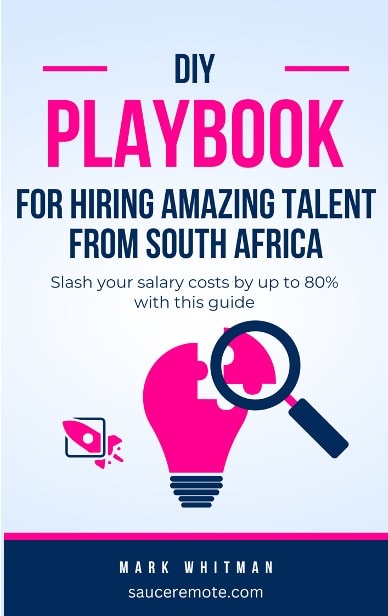What’s an RPO? RPO stands for recruitment process outsourcing. It’s when a company engages an external service provider to assist with recruitment.
But there’s a lot more to an RPO than outsourcing recruitment.
Join me as I discuss the different types of RPOs, the benefits of working with an RPO, costs and more.
Ready? Let’s roll.

Discover how to slash your salary costs by 80%
Get our exact process for hiring amazing overseas talent from South Africa. Includes copy-and-paste templates and a detailed salary guide.
What is an RPO?
RPO, or Recruitment Process Outsourcing, is when a company transfers all or part of its recruitment activities to an external service provider.
This third party takes over tasks like sourcing candidates, managing job postings, conducting interviews, and even onboarding new hires, acting as an extension of the company’s HR team.
Here’s an example of how an RPO works:
Amazon has used RPO providers to manage parts of its recruitment process, particularly during high-volume hiring seasons.
For instance, when Amazon needed to rapidly scale its workforce to meet demand during the holiday season, it partnered with an RPO provider to handle sourcing, screening, and onboarding thousands of temporary workers.
This partnership allowed Amazon to focus on its core operations while ensuring it had the workforce needed to handle increased demand.
But wait, how does RPO differ from other hiring solutions?
Well, unlike traditional staffing agencies that just provide candidates, RPO providers manage the entire recruitment process, from strategy to execution.
So, an RPO helps companies streamline hiring, reduce costs, and improve talent quality.
Hire remote talent from South Africa & slash salary costs by 80%
Salaries start from £8,000 per year!
Why Consider an RPO: 5 Exciting Benefits of an RPO
1. Cost Efficiency
RPOs can help your company save significantly on recruitment costs.
By outsourcing the recruitment process, companies reduce the need for internal recruitment teams, advertising expenses, and costly recruitment technologies.
A 2022 study found that companies using RPO services often see a reduction in hiring costs of up to 30%, mainly due to improved hiring efficiencies and economies of scale.
My point?
This translates to savings in time and resources. RPOs let companies allocate funds to other strategic areas.
But, cost efficiency is only one of the benefits of recruitment process outsourcing.
2. Improved Hiring Metrics
Partnering with an RPO provider enhances hiring metrics across the board.
RPOs have access to advanced tools, technology, and data analytics that help improve key metrics like time-to-fill, quality of hire, and retention rates.
For example, companies using RPO services can see their time-to-fill reduced by up to 40% and retention rates improved by 50% due to better matching and candidate engagement practices.
3. Scalability and Flexibility
RPOs can scale recruitment efforts up or down based on your organisation’s needs.
Whether a company needs to hire 100 people immediately or slow down during lean periods, an RPO can adapt to meet these changing demands without the long-term commitment of maintaining a large internal HR team.
This flexibility is precious for companies experiencing rapid growth or seasonal fluctuations in hiring needs.
4. Access to Recruitment Expertise
RPO providers bring a wealth of expertise and specialised knowledge to the table.
They offer best practices, market insights, and access to a broader talent pool that may not be available to in-house teams.
This expertise translates into a more strategic approach to hiring. They can align recruitment tactics with business goals and attract high-quality candidates that match your company's culture and values.
5. Enhanced Candidate Experience
An RPO can significantly enhance the candidate experience by creating a seamless, engaging recruitment journey.
From efficient communication to quick follow-ups, RPOs ensure candidates feel valued and informed throughout the process.
A positive candidate experience strengthens your employer brand, leading to better quality hires and higher candidate satisfaction rates.
Research shows that organisations partnering with an RPO see up to a 25% increase in candidate satisfaction scores.
Hire remote talent from South Africa & slash salary costs by 80%
Salaries start from £8,000 per year!
4 Types of RPO Engagements
Here’s the thing: Recruitment Process Outsourcing (RPO) isn't one-size-fits-all. There are several RPO models designed to meet different organisational needs.
But don’t worry, I’ll break it down into the main types for you:
1. Full Talent Lifecycle RPO
The Full Talent Cycle RPO model is the first and most common RPO type. This model covers every stage of recruitment, from job requisition to onboarding.
It’s a comprehensive solution where the RPO provider manages all aspects of hiring.
It’s ideal for companies with large-scale hiring needs or those looking for a strategic partner to transform their talent acquisition process.
Think of this as a complete, end-to-end recruitment service that handles everything, including workforce planning, employer branding, and compliance.
2. Hybrid-Select Process RPO
The next model is the Hybrid-Select process. Hybrid-Select combines the strengths of both in-house teams and RPO providers.
It allows companies to outsource specific parts of the recruitment process while retaining control over others.
For instance, a company might outsource candidate sourcing and screening while keeping interviews and final hiring decisions in-house.
This model is great for organisations that want to maintain some control but still need expert support in certain areas.
3. On-Demand/Project RPO
On-Demand or Project RPO is a flexible, short-term engagement designed for companies that need to ramp up hiring quickly for a specific project or during peak periods.
The RPO provider manages recruitment for a defined period or a specific number of roles.
It’s an ideal solution for seasonal hiring, launching new departments, or filling roles in a new market.
4. Contingent RPO
This model focuses on the recruitment of contingent or temporary workers.
The RPO provider oversees sourcing, screening, and managing temporary staff, often for high-volume roles.
This model is perfect for organisations that rely heavily on temporary or contract workers and want to streamline this aspect of their recruitment process.
Now that we understand the different RPO types let’s discuss costs.
Hire remote talent from South Africa & slash salary costs by 80%
Salaries start from £8,000 per year!
How Much Does an RPO Cost?
The cost of Recruitment Process Outsourcing (RPO) can vary depending on the provider, the scope of services, and the specific needs of your business.
But luckily, there are some common pricing models for RPOs:
1. Management Fee Model
This is a fixed monthly fee that covers the cost of managing the recruitment process.
The fee is typically based on the number of hires or the scope of services provided. It's ideal for companies that want predictable costs and a consistent level of service.
This model works well for organisations with steady, ongoing hiring needs, as it simplifies budgeting and allows for a long-term partnership with the RPO provider.
2. Pay for Performance Model
Under this model, fees are tied to specific performance metrics, like the number of successful hires or the speed of the recruitment process.
You pay based on results, which aligns incentives between your company and the RPO provider. It's a good choice for companies that want to ensure they’re only paying for tangible outcomes.
However, it may involve higher costs if the provider consistently meets or exceeds targets.
3. Hybrid-Blended Model
The Hybrid-Blended model combines elements of both the Management Fee and Pay for Performance models.
It usually involves a lower base management fee combined with performance-based incentives. This model offers a balance between predictable costs and performance-driven rewards.
It provides flexibility and can be customised to fit your business's unique hiring needs, making it a popular choice for many organisations.
Hire remote talent from South Africa & slash salary costs by 80%
Salaries start from £8,000 per year!
How to Choose the Right RPO Provider
Selecting the right Recruitment Process Outsourcing (RPO) provider is crucial for achieving your hiring goals. Here are the key factors to consider:
1. Services and Scope
Evaluate the range of services offered.
Does the RPO provider cover the entire recruitment process, or do they specialise in certain areas, such as sourcing, screening, or onboarding?
Look for a provider that aligns with your specific needs.
For instance, if you have a high volume of hires or specific roles, you'll need an RPO offering comprehensive, end-to-end services.
On the other hand, a more tailored solution may be suitable if you need support in only a few areas.
2. Technology and Innovation
Consider the provider's technology stack.
Do they leverage the latest tools, such as AI for candidate sourcing, advanced applicant tracking systems (ATS), or data analytics for hiring metrics?
A technologically advanced RPO provider can significantly improve the speed and quality of your hiring process.
Technology can be a differentiator, but it's essential to ensure that it integrates seamlessly with your existing systems.
Hire remote talent from South Africa & slash salary costs by 80%
Salaries start from £8,000 per year!
3. Global Reach and Flexibility
If your organisation operates in multiple countries or plans to expand internationally, it is vital to choose an RPO provider with a proven global reach.
The provider should understand local labour laws, cultural differences, and regional market trends.
Flexibility is also critical—make sure they can scale up or down based on your business needs, whether you are hiring a few roles in a new market or staffing an entire department globally.
This is where an Employer of Record (EOR) service, like Sauce, might offer a distinct advantage.
While an RPO focuses on recruitment, an EOR can provide a more comprehensive solution by managing employment responsibilities like payroll, taxes, and compliance.
This broader support can be particularly beneficial for organisations looking to expand internationally without setting up a local entity.
4. Strategic Alignment and Partnership Approach
Your RPO provider should act as a strategic partner, not just a service provider. Look for a provider who aligns with your company’s values, culture, and long-term goals.
An RPO can optimise your hiring process, but it may lack the deeper alignment with the core business strategy that some organisations seek.
My Final Thoughts
And there you have it. I shared a quick and easy answer to the question, “What’s an RPO?”
As you can see, an RPO is fantastic, but an even better option is to go with an EOR service, like Sauce. You won’t regret it.
